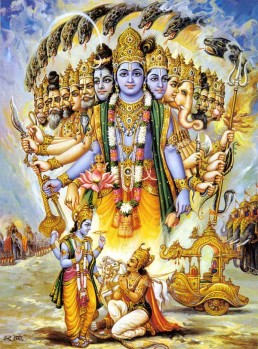Swami Chinmayananda
Swami Chinmayananda Commentary
A limited human intellect is not the instrument with which one can perceive in one sweep the Infinite majesty of the Universal-Form. It must necessarily stand staggered at the vastness of the concept and the significances of Its sheer dimensions. That the Lord is the ONE dynamic Truth behind every organ of activity and in every existent thing is indicated here when Arjuna says “I SEE THEE OF BOUNDLESS FORM ON EVERY SIDE, WITH MANIFOLD ARMS, STOMACHS, MOUTHS AND EYES.” This is not to be construed as a caricature of Truth. This warning is necessary for all hasty artists, who, inspired by the theme, generally rush to this field of thought, to represent this Cosmic Form with their brushes and colours. And they all but fail miserably!
The Universal Oneness is not an object of perception; it is only a fact to be realised or apprehended. This is endorsed by the the very words of Arjuna that immediately follow in the stanza, “NEITHER THE END, NOR THE BEGINNING, NOR THE MIDDLE OF THEE DO I SEE.” The description of the Truth — from which all names and forms arise, in which they exist, and into which they all merge back at the end of their temporary play — cannot be better done in any other way and those who, with sympathetic understanding, get at the real import of these stanzas can appreciate their rich beauties and luxurious warmth.
The above stanzas express the oneness that threads through the mortal beings and finite things of the world, making a single garland of them all!
IT MAY BE DOUBTED WHETHER THE DEIFIED DENIZENS OF THE DIVINE HIERARCHY ARE ALSO REPRESENTED UPON THIS WONDER-FORM. THIS IS ANSWERED IN THE FOLLOWING:
Adi Sankara Commentary
Pasyami, I see; tvam, You; aneka-bahu-udara-vaktra-netram, as possessed of numerous arms, bellies, mouths and eyes; ananta-rupam, having infinite forms; sarvatah, all around. Visveswara, O Lord of the Universe; visva-rupa, O Cosmic Person; na pasyami, I see not; [‘I do not see-because of Your all-pervasiveness.’] tava, Your; antam, end; na madhyam, nor the middle-what lies between two extremities; na punah, nor again; the adim, beginning-I see not the limit (end) nor the middle, nor again the beginning, of You who are God! Furthermore,
The Bhagavad Gita with the commentary of Sri Sankaracharya – Translated by Alladi Mahadeva Sastry
Holy Geeta – Commentary by Swami Chinmayananda
The Bhagavad Gita by Eknath Easwaran – Best selling translation of the Bhagavad Gita
The Bhagavad Gita – Translation and Commentary by Swami Sivananda
Bhagavad Gita – Translation and Commentary by Bhaktivedanta Swami Prabupadha
Srimad Bhagavad Gita Chapter 11 – Verse 16 – 11.16 aneka bahudaravaktra – All Bhagavad Gita (Geeta) Verses in Sanskrit, English, Transliteration, Word Meaning, Translation, Audio, Shankara Bhashya, Adi Sankaracharya Commentary and Links to Videos by Swami Chinmayananda and others – 11-16

